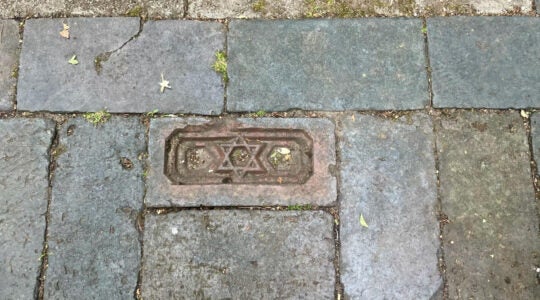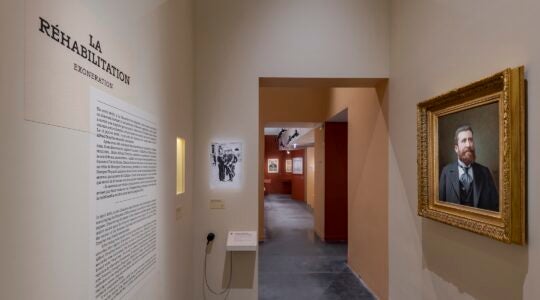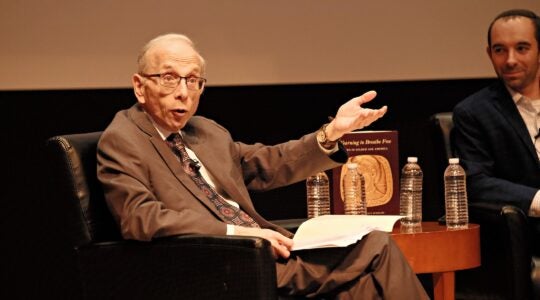What does it mean to reflect on something that is missing – a person who has passed, a story left untold, a voice forgotten?
The Torah is silent about Rebecca’s death. This week’s parshah should have included a note about Rebecca’s passing, but it doesn’t. It is only at the end of the book of Genesis that we learn that Rebecca is buried in the Cave of Machpelah, along with most of the other matriarchs and patriarchs.
It’s a surprising omission, given Rebecca’s importance in the narrative.
Rabbinic sources notice this unexpected absence, and they offer various interpretations to account for it. Genesis Rabbah cleverly adds Rebecca’s death back into the narrative. This midrash suggests that when Genesis 35:8 announces the death of Rebecca’s nurse, Deborah, it also hints at Rebecca’s passing: “And Deborah, Rebecca’s nurse, died, and she was buried under an oak below Bethel, so it was called allon bachut.” The biblical text narrates that the place of Deborah’s burial, under an oak tree, is called “allon bachut” (אַלּוֹן בָּכוּת), which literally means the “Oak of Weeping.” The midrash suggests, however, that instead of reading “allon” as a Hebrew word (אַלּוֹן), meaning “oak,” it ought to be read as a Greek word (ἄλλον), meaning “another.” Thus, the place of Deborah’s burial is named not “Oak of Weeping,” but rather “Another Weeping.” And to what does the name “Another Weeping” refer? It alludes to the fact that when Jacob learned about Deborah’s passing, he also learned about the passing of his mother Rebecca.
Thus the midrash figures out a way of incorporating Rebecca’s death into the biblical story, even though it isn’t there explicitly in the text.
This linguistically sophisticated midrash made its way into synagogues, in the form of both Bible translations and liturgical poetry. Targum Pseudo-Jonathan, for example, inserts this reading into its Aramaic rendition of Genesis 35:8, noting that Jacob mourned not only for Deborah but also for his mother Rebecca (וברם תמן אתבשר יעקב על מיתת רבקה אימיה). A piyyut by Yannai also adopts this midrash, describing how, shortly after learning about Deborah’s passing, Jacob was overcome with grief when he learned about his mother’s death:
“The news of Rebecca came, that she had set forth on her journey
Not yet at ease from the pain in the soles of his feet –
before he had quiet from [Deborah’s] death upon the road
the nursemaid of ‘she who writhed in childbirth’
He began to tremble hearing of the death of she who gave him birth
He cried out and was grieved, weeping [doubly much]
therefore that selfsame place was called ‘Another Weeping.’” (trans. Laura Lieber, Yannai on Genesis, 642-645).
This qedushta (a special piyyut recited as part of a Shabbat or festival shacharit) thematizes Jacob’s doubled loss and emphasizes the tremendous depth of his grief upon learning the sad news of compounded death – he mourns both the death of his mother’s nurse, Deborah, and then the death of his mother, Rebecca (and shortly thereafter also the untimely, tragic death of his young wife Rachel, during childbirth).
Rabbinic readings also offer explanations for why the biblical text omits explicit mention of Rebecca’s death. Pesiqta de-Rav Kahanah posits that the silence surrounding Rebecca’s death was designed to save her from the embarrassment of her son Esau’s wickedness. Because her father-in-law Abraham was dead, her husband Isaac was too weak to accompany her bier, and her son Jacob was on the road, only her son Esau would have been available to escort Rebecca to her final resting spot. To avoid shaming Rebecca in this way, the midrash explains that Rebecca was buried at night, without a public funeral nor public statements.
The most intriguing account of Rebecca’s passing, however, appears in a text that itself was omitted from the Jewish canon – a text that was forgotten. The book of Jubilees, composed in the second century BCE, retells stories from Genesis and the first half of Exodus. It devotes a full chapter to the end of Rebecca’s life and to her death and burial.
It suggests that Rebecca’s final task was orchestrating peace between her rival sons, and reimagines her funeral as a ceremony of reconciliation.
Chapter 35 of the book of Jubilees begins with Rebecca disclosing to Jacob that she has learned through a dream that she will die that year, at the age of 155 years old. Jacob laughs when he hears this news, because Rebecca appears so strong and healthy. He nonetheless commits to fulfill Rebecca’s last wish, that he honor his father and brother for the rest of his life. After speaking with Jacob, Rebecca finds her husband Isaac. She succeeds in convincing Isaac to ensure, after her passing, that Esau doesn’t harm Jacob, because she knows that Esau wishes to kill Jacob. Finally, Rebecca finds Esau and tells him the sad news of her impending death. She makes two final request of him, too:
“I ask you that the day I die, you will take me in and bury me near Sarah, your father’s mother, and that you and Jacob will love each other and that neither will desire evil against the other, but mutual love only, and (so) you will prosper, my sons, and be honored in the midst of the land, and no enemy will rejoice over you, and you will be a blessing and a mercy in the eyes of all those who love you.” (trans. Charles, 1913)
First, Rebecca asks Esau to bury her alongside her mother-in-law, Sarah. Second, she begs Esau to find a way for him and Jacob to love each other. Esau agrees, assuring his mother that he will honor both her wishes, burying her besides Sarah and loving Jacob:
“And Jacob, my brother, also, I shall love above all flesh; for I have not a brother in all the earth but him only: and this is no great merit for me if I love him; for he is my brother, and we were sown together in your body, and together we came forth from your womb, and if I do not love my brother, whom shall I love? …And I swear to you that I shall love him, and not desire evil against him all the days of my life but good only.” (trans. Charles, 1913)
Rebecca then performs her very last deed: she reunites Jacob and Esau for a meal.
Thus the three figures – Rebecca and her rival twin sons – eat and drink together. Rebecca dies at the end of the meal, after which Esau and Jacob bury their mother.
While Pesiqta de-Rav Kahanah argues that Rebecca did not have a funeral because no one wanted Esau’s presence to dishonor Rebecca’s memory, the book of Jubilees suggests that Rebecca’s final act was repairing the relationship between Jacob and Esau that she herself broke when she instructed Jacob to trick Esau out of his first-born blessing – and thus portrays Esau’s presence at her funeral as a sign of her success rather than her failure. In the book of Jubilees, Rebecca’s death is not only recounted.
It is also remembered as an opportunity for reconciliation, righting wrongs, and reconstituting peace between brothers.
Let’s return to the questions with which we began: What does it mean to reflect on something that is missing – a person who has passed, a story left untold, a voice forgotten?
These are days of devastating death – deaths that happen alone, mourned in solitude, their magnitude even sometimes unacknowledged because of their ubiquity. All of these sources attempt, in their own way, to remember a moment that is missing from the biblical text and to commemorate the passing of a figure whose passing is unacknowledged or imagined to transpire alone, in the dark of night, without announcement. They narrate the unnarrated.
They also imagine alternate endings, ones that end in peace rather than in darkness.
Drawing upon a diversity of voices from our tradition – second temple sources, rabbinic midrashim, targumim, and piyyutim – also allows us to remember in a different way: to lift up a fuller range of Jewish traditions, including those that did not make their way onto the conventional Jewish bookshelf and into our collective storytelling.
Who knew that Rebecca did not only orchestrate a rivalry between her sons, but also brought them back together before she died? Those voices sometimes offer new ways of reflecting on what is missing, filling in the gaps, and remembering the past in hopeful ways.
Sarit Kattan Gribetz is an associate professor in the Theology Department at Fordham University. Her areas of research and teaching include rabbinic literature, the history of Jews in the Roman Empire, conceptions of time and time-keeping, and gender and sexuality. Her first book, Time and Difference in Rabbinic Judaism (Princeton University Press, 2020) examines how rabbinic texts use time to define Jewish identity. She is now writing her second book, Jerusalem: A Feminist History. Sarit received her B.A. and Ph.D. from the Religion Department at Princeton University, studied Talmud and Archaeology at the Hebrew University of Jerusalem as a Fulbright Fellow, and served as a research fellow at the Israel Institute for Advanced Study.
Posts are contributed by third parties. The opinions and facts in them are presented solely by the authors and JOFA assumes no responsibility for them.
If you’re interested in writing for JOFA’s blog contact dani@jofa.org. For more about JOFA like us on Facebook or visit our website.
The New York Jewish Week brings you the stories behind the headlines, keeping you connected to Jewish life in New York. Help sustain the reporting you trust by donating today.




